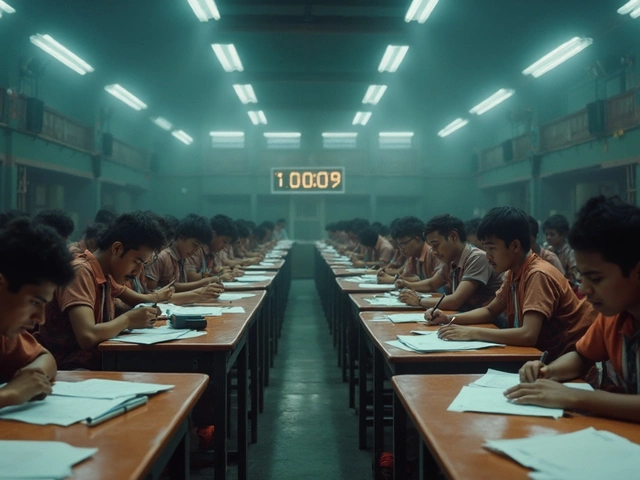Few experiences in the American educational system are as universally daunting as competitive exams. These tests, ranging from entrance exams for elite universities to professional certification assessments, are often viewed as the hardest classes students will ever face. They require a unique blend of intense study, exceptional problem-solving skills, and a resilient mindset.
Why are these exams considered so challenging? It’s more than just the vast array of topics they cover. The high stakes and limited time frames add layers of pressure that can test even the most prepared individuals. In mastering these exams, students often learn valuable lessons in patience, determination, and self-motivation.
But what separates a student who succeeds from one who struggles? The answer often lies in understanding the nature of these exams and developing an effective preparation strategy. With thoughtful planning and insights from those who have navigated these paths before, anyone can learn not just to survive these exams, but to thrive in them.
- The Rigorous World of Competitive Exams
- Key Features Defining Difficulty
- Popular Tough Exams in America
- Psychological Pressure and Preparation
- Success Stories and Strategies
- Future Trends in Competitive Exams
The Rigorous World of Competitive Exams
Competitive exams are a staple of the American academic landscape, representing a gateway to prestigious colleges, graduate programs, and lucrative careers. These examinations serve a critical role, establishing benchmarks for merit and excellence. Their fundamental goal is to sift through a vast pool of candidates to identify those with the highest potential or most suitable skills for advanced study or professional roles. This filtering process, though intrinsically fair, often feels like navigating a labyrinth for students who strive to balance high expectations with self-driven motivation.
When one examines the anatomy of the hardest class in America—competitive exams—what stands out is an unwavering commitment to comprehensive assessment. The exams encompass a broad spectrum of subjects, demanding mastery over diverse topics and concepts. For instance, the SAT and ACT challenge students with rigorous sections on mathematics, evidence-based reading, and analytical writing, testing knowledge and critical thinking under time constraints. Meanwhile, professional tests like the LSAT or MCAT delve deep into specialized areas, assessing logic, reasoning, and applicable knowledge in a specific field. Each exam is meticulously designed to challenge and stretch the capabilities of even the most gifted students.
The perception of these exams’ difficulty often goes beyond the breadth of content. Students know they are a rite of passage that can significantly influence their future paths. According to a study by the College Board, around 2.2 million students took the SAT in recent years, with countless others tackling analogous hurdles. This statistic highlights not only their popularity but also the fierce competition and pressure enveloping them. It's little wonder that many students feel as if they're running a marathon, requiring endurance and strategic thinking. As Harvard educationalist Sarah McGarvey once noted, "These exams are not just about testing what you’ve learned, but measuring how well you can apply knowledge under pressure."
In this landscape, many students turn to a variety of resources to gain an edge. The popularity of preparatory classes and tutors, whether through a traditional classroom, online platforms, or personalized coaching, speaks to the collective effort to master these exams. Students and parents allocate substantial time and resources, recognizing the transformative potential of excelling in these tests. At its heart, preparation is not merely about memorizing facts or practicing problems—it is about developing resilience and a strategic mindset. With these tools, students aim to conquer the complex challenges posed by the hardest class in the United States.
The allure and challenge of competitive exams are clear and pervasive. They compel students to push the boundaries of their knowledge and capabilities. No shrines of academia are immune to this exacting scrutiny, from elite private schools to sprawling public universities. What remains consistent across the board is the rigor and demand for excellence. By understanding this, students can navigate the pressure with clarity and purpose, turning potential obstacles into opportunities for growth and achievement.
Key Features Defining Difficulty
When students talk about the hardest class in America, they're often referencing a host of overwhelming factors that make competitive exams a true test of endurance and intellect. One can begin by considering the vast scope of subjects that these exams cover. From the nuanced intricacies of calculus to the vast expanse of American history, any single exam might span multiple disciplines, each demanding thorough understanding and rapid recall.
Some of the defining elements that escalate the complexity include the time constraints under which students must operate. Imagine compressing months of learning into a series of problem-solving exercises performed in mere minutes. This requires not only the mastery of content but also quick thinking and effective time management. The pressure mounts, as these exams often serve as gatekeepers to prestigious opportunities and future careers.
Many candidates believe that the standardized nature of these exams contributes significantly to their daunting reputation. No personalization here – everyone faces the exact same set of questions, meaning one small mistake can make a large impact on the overall outcome. To mitigate this risk, students must often engage in repetitive practice and seek to understand the strategic questioning styles employed. This train of thought was aptly captured when a renowned educational psychologist noted, "The pattern recognition needed is akin to swiftly solving puzzles under pressure."
Moreover, competitive exams incorporate advanced levels of cognitive understanding, often evaluating critical thinking skills far more than rote memorization. They're designed to sift through large groups of candidates efficiently, identifying those who not only know the material but can also apply it innovatively under pressure. Herein lies a key aspect of why they're consistently referred to as some of the toughest tests.
The high psychological stakes further complicate matters. For many test-takers, these exams act as pivotal moments, much like the SAT or GRE, dictating the next stage of their academic or professional journey. The fear of failure can be as much of an obstacle as the actual exam content. This pressure often results in what can be termed 'analysis paralysis', where students find themselves stuck in familiar patterns of thought without adequately progressing.
A unique element not often acknowledged is the adaptive difficulty feature of some exams. Certain computer-based tests, such as the GRE, adjust the difficulty of subsequent questions based on a student's performance in preceding sections. This dynamic aspect can be intimidating, as the belief that any wrong answer might make future questions harder or easier adds another layer of stress.
The factors listed above are part of what defines the inherent challenges of these exams, making them the ultimate academic hurdle for many. However, with strategic preparation and the right mindset, they can also serve as platforms for demonstrating exceptional proficiency and resilience.

Popular Tough Exams in America
In the sprawling landscape of American education, several exams consistently emerge as gatekeepers to the nation's most coveted academic and professional arenas. Among these, the SAT, ACT, and GRE are time-tested challenges for college and graduate school hopefuls. The SAT, a standardized test for college admissions, assesses students' readiness through critical reading, writing, and math. Scoring well requires months of preparation, cementing it as a hardest class of sorts. The ACT, its rival, measures English, math, reading, and science, often preferred in the Midwest and Southern states. Success hinges not just on knowledge but strategic time management, because pacing can make or break scores.
Above college levels, the Graduate Record Examination (GRE) tests analytical writing, quantitative reasoning, and verbal reasoning, crucial for aspiring postgraduates across the disciplines. Business schools have their own rigorous challenge—the GMAT, a test famed for its data sufficiency questions and complex critical reasoning that potential business leaders must ace. It's often not the breadth of knowledge, but the depth of understanding and application that invites sleepless nights.
Professional fields aren't exempt either; the bar exam looms large for aspiring lawyers. Known for its grueling breadth across multiple domains of law, it requires a hefty dedication to memorization and application practice. Yet, perhaps the most difficult of all, due to sheer pressure, may be the USMLE, the medical licensing exam. Future doctors face three intense steps, each essential to career progression. Nearly every aspiring physician marks it as a rite of passage, indicating readiness to practice safely and effectively.
“The bar exam is not just a test of knowledge,” said renowned educator Harold Bloom.
“It is a test of endurance and the ability to organize vast amounts of information under extreme pressure.”Similar sentiments resonate across these challenges, underscoring another layer of complexity: the psychological.
Success stories abound, of course—each providing a roadmap of strategic study, diligent review, and incremental testing to conquer these titans. But with these exams evolving, keeping abreast of changes is essential. As institutions pivot toward diverse assessment methods and adaptive testing formats, students must remain agile, constantly adapting their preparation strategies to new terrains.
Psychological Pressure and Preparation
Navigating the labyrinth of psychological pressure in competitive exams can be daunting. Students often describe the experience as a marathon that requires not just physical stamina, but emotional resilience and mental endurance as well. The anticipation leading up to the exam itself can be nerve-wracking. It is essential to recognize that the stress associated with high-stakes exams is not merely an individual challenge—it's a common hurdle shared by many.
The mental load is compounded by the high standards set by institutions. For the hardest class in America's competitive exams like the SATs, MCATs, or GREs, students are expected to demonstrate their capability under a ticking clock. With so much riding on a single performance, it is no wonder anxiety levels escalate. Preparing effectively for these exams isn't solely about mastering content; it's also about managing stress and staying motivated amidst pressure.
Approaching the exams strategically can transform stress into a catalyst for success. Techniques such as mindfulness and time management can ease exam-related anxieties. Mindfulness helps in maintaining focus and reducing stress levels by keeping the mind anchored in the present. Time management skills enable students to allocate sufficient study periods while ensuring adequate rest, balancing rigorous preparation with necessary breaks. “Success is not the key to happiness. Happiness is the key to success. If you love what you are doing, you will be successful,” as Albert Schweitzer astutely observed, highlights the importance of maintaining a positive and healthy outlook throughout the preparation period.
Creating a study plan tailored to individual strengths and weaknesses can also bolster confidence. A clear roadmap helps in setting tangible goals and tracking progress objectively, which is vital in motivating continuous effort. Furthermore, assembling a support network of friends, family, or study groups enriches the preparation experience. Group discussions offer diverse perspectives which can illuminate complex topics, helping each participant sharpen their understanding.
Many students have found success by incorporating practice exams into their preparation routine. These simulate actual testing conditions, which helps accustom students to the time constraints and question formats, fostering familiarity and reducing uncertainty. This level of preparedness often translates into improved performance on the actual exam day. As students become accustomed to the pressure, they can harness it as a source of energy rather than anxiety.
In a study published by the American Psychological Association, about 52% of students reported that stress negatively affected their performance in high-stakes exams. Engaging in regular physical exercise, maintaining a balanced diet, and ensuring adequate sleep are critical yet often overlooked aspects of preparation that can positively influence mental health and cognitive function. These lifestyle choices can have a profound impact on one’s ability to concentrate and retain information.

Success Stories and Strategies
Throughout the history of education, tales of perseverance and triumph against the odds have taught us invaluable lessons. Among these stories are those of students who have taken on the daunting challenge of America's hardest competitive exams and emerged victorious. Their pathways to success offer more than just inspiration; they provide practical strategies that others can emulate. Consider, for instance, the journey of students preparing for the MCAT, often termed one of the toughest pre-medical exams. Those who succeed on the MCAT not only possess a keen understanding of science and medicine but often master time management and stress reduction techniques that transcend the test itself.
One common thread among these success stories is the emphasis on a strategic approach to preparation. Individuals often break down the vast syllabus into manageable chunks, setting daily and weekly goals. This not only eases the burden but also fosters a consistent study rhythm. Such a methodical approach was famously advocated by a top-scoring academic, who once said,
"Success in competitive exams is often the result of smart effort, not just hard work."With this mentality, students often find ways to optimize their study habits, leveraging resources like study groups, tailored coaching, and online platforms that offer practice questions and mock tests.
Another critical factor is the psychological toolkit that successful students develop. Facing intense pressure, they learn resilience, staying calm and composed under grueling conditions. Techniques such as mindfulness meditation and structured breaks are not merely buzzwords but proven methods to maintain mental health during preparation. The story of Amir, a student who excelled in the GRE, highlights the power of mental preparedness. By incorporating brief, focused meditative sessions into his daily routine, Amir was able to drastically improve his concentration and reduce anxiety, eventually surpassing his target score.
Peer support and collaboration are also instrumental in these success narratives. Students who form study groups not only benefit from collective knowledge but also find an outlet for sharing frustrations and wins, making the journey less solitary. According to a recent survey, over 70% of top performers in standardized tests admitted to studying in groups and acknowledged it as a key component of their success. Competitive exams demand a balance of discipline, knowledge, and emotional intelligence. Armed with the right strategies and a supportive community, students can turn what is often perceived as America's hardest class into a defining moment of their educational trek.
Future Trends in Competitive Exams
As the landscape of education continues to evolve, competitive exams are not immune to these changes. One of the most significant trends shaping the future of these exams is the integration of technology. Digital platforms are being increasingly utilized to not only conduct exams but also to prepare candidates for them. This shift offers both challenges and opportunities. For example, online exam systems allow for a more standardized and accessible testing process, reducing geographical and logistical barriers. However, they also raise questions about security and the potential for inequity in access to technology.
"The shift towards digital exams is transformative and necessary, yet it demands careful consideration of data security and equal access," remarks Dr. Emily Chang, an education technology consultant.
Another major trend is the rise of personalized learning experiences driven by adaptive learning technologies. These tools enable candidates to focus on their weak areas through tailored content and practice materials, increasing efficiency in their study routines. As a result, the learning process becomes more student-centered, helping them to better tackle the hardest classes represented by these exams. This customization can potentially level the playing field, offering every examinee a fair chance to succeed.
Additionally, there is an increasing emphasis on interdisciplinary knowledge which is reflected in exam syllabi. Rather than assessing rote memorization, future exams are likely to test critical thinking and problem-solving skills that transcend traditional subject boundaries. This aligns with the needs of a rapidly changing workforce where adaptability and innovative thinking are highly valued. Students preparing for these exams might benefit from focusing on broader learning outcomes and engaging with content that encourages a holistic understanding.
Wholistic Evaluation and Practice
The future also holds a trend towards formative assessments throughout the preparation phase instead of a singular summative test. Continuous evaluation through practice exams and feedback loops will likely become more common. This ongoing assessment can help mitigate the intense pressure associated with one-time testing events by providing students with numerous opportunities to demonstrate their abilities. Educational bodies are working towards making these evaluations more reflective of a candidate’s true capabilities, beyond just academic prowess.
| Trend | Impact |
|---|---|
| Digitalization | Increased accessibility and standardization |
| Personalized Learning | More focused and efficient study practices |
| Interdisciplinary Focus | Enhanced critical thinking and adaptability |
| Formative Assessment | Reduced exam pressure and holistic evaluation |
Lastly, the global nature of these exams is becoming more pronounced. As universities and corporations become more interconnected internationally, competitive exams are being tailored to be relevant across borders. This globalization demands a focus on cultural competency as a tested skill. Students might see this as a push toward global education standards, and preparation might require engagement with diverse viewpoints and subjects that encapsulate global issues.



